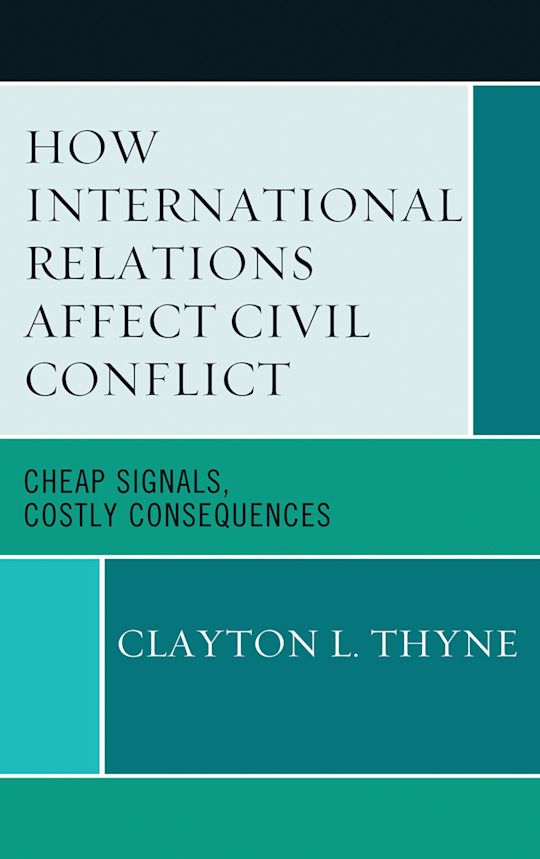- Home
- ACADEMIC
- Politics & International Relations
- Introduction to International Relations
- How International Relations Affect Civil Conflict
How International Relations Affect Civil Conflict
Cheap Signals, Costly Consequences
How International Relations Affect Civil Conflict
Cheap Signals, Costly Consequences
This product is usually dispatched within 1 week
- Delivery and returns info
-
Free CA delivery on orders $40 or over
You must sign in to add this item to your wishlist. Please sign in or create an account
Description
Given the appalling consequences of civil wars, why are the competing actors within a state unable to come to a settlement to avoid the costs of conflict? How might external parties affect the likelihood that a civil war begins? How do their actions affect the duration and outcome of civil conflicts that are already underway? How International Relations Affect Civil Conflict draws on three main approaches-bargaining theory, signaling theory, and rational expectations-to examine how external actors might affect the onset, duration and outcome of civil wars.
Signals from external actors are important because they represent a potential increase (or decrease) in fighting capabilities for the government or the opposition if a war were to begin. Costly signals should not affect the probability of civil war onset because they are readily observable ex ante, which allows the government and opposition to peacefully adjust their bargaining positions based on changes in relative capabilities. In contrast, cheap hostile signals make civil war more likely by increasing the risk that an opposition group overestimates its ability to stage a successful rebellion with external support. Cheap supportive signals work in the opposite manner because they represent increased fighting capabilities for the government. Furthermore, signals sent in the pre-war period have important implications for the duration and outcome of civil conflicts because competing intrastate actors develop expectations for future interventions prior to deciding to fight.
In this book, Clayton L. Thyne tests this theory by examining the likelihood of civil war onset, the duration, and the outcome of all civil wars since 1945, finding strong support from empirical tests for each component of this theory. The conclusion offers specific advice to US policy-makers to prevent the outbreak of civil conflict in states most at-risk for civil war and to help end those that are currently underway. This book will appeal to undergraduate and graduat
Table of Contents
Chapter 2. The Argument: How Interstate Signals Affect Civil Conflicts
Chapter 3. Interstate Signals and Civil War Onset
Chapter 4. A Puzzling Rebellion: Interstate Signals and Civil War Onset in Nicaragua
Chapter 5. Interstate Signals and Civil War Duration
Chapter 6. Interstate Signals and Civil War Outcome
Chapter 7. The Consequences of Contradiction: Civil War Duration and Outcome in Iraq
Chapter 8. Lessons Learned and Implications for US Foreign Policy
Chapter 9. Summary and Directions for Future Research
Product details
| Published | Sep 24 2009 |
|---|---|
| Format | Hardback |
| Edition | 1st |
| Extent | 254 |
| ISBN | 9780739135464 |
| Imprint | Lexington Books |
| Dimensions | 240 x 163 mm |
| Series | Innovations in the Study of World Politics |
| Publisher | Bloomsbury Publishing |
About the contributors
Reviews
-
Do domestic and international political conflict intersect? Of course they do, but how that intersection occurs is not yet well understood. Thyne's book, How International Relations Affect Civil Conflict, establishes an important relationship: the onset, duration, and outcomes of civil wars are strongly influenced by states' and rebels' expectations about the likely intervention of other countries. Relying on evidence that ranges from historical accounts of specific cases to the average effects gleaned from sophisticated large-N analyses, Thyne finds considerable empirical support for his hypotheses. This work considerably advances out understanding of civil wars, and it also serves as an excellent example of the leverage gained from a combination of careful theoretical and empirical work.
Will H. Moore, Florida State University
-
Thyne's book is an insightful application of bargaining theory that illuminates how external actors can affect the risk of civil conflict. Thyne argues that costly signals by other states towards a country at risk of civil war-contrary to common belief-are likely to be less relevant than weak signals. Whereas costly signals are unlikely to provide any new information that may alter existing demands and expectations in the interaction between antagonists, cheap signals can have an important influence on political stability and the risk of civil war. This book deserves to be read by anyone interested in how international factors may affect civil war onset and duration.
University of Essex, Kristian Skrede Gleditsch, University of Essex



































